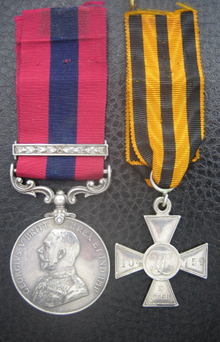
DISTINGUISHED CONDUCT MEDAL, G.V.R., WITH SECOND AWARD BAR ‘899 CPL. T. DUFFY. 1/MANCH: REGT.’, RUSSIA, EMPIRE, CROSS OF ST GEORGE, 3RD CLASS, THE REVERSE NUMBERED ‘104 759’
D.C.M. London Gazette 18 February 1915; citation London Gazette 1 April 1915:
‘For conspicuous gallantry near Neuve Chapelle on 27th November 1914, in the attack on the enemy’s sap-heads, and subsequently for great courage in leaving his trench under very heavy machine-gun fire, and bringing three wounded men into cover.’
Bar to D.C.M. London Gazette 20 October 1916:
‘For conspicuous gallantry during an attack. Sjt. Duffy and his officer were the first men in a redoubt, and when the latter was wounded he led the men forward with great coolness and bravery.’
Russian Cross of St George, 3rd Class, London Gazette 24 August 1915.
M.I.D. London Gazette 17 February 1915 (France)
M.I.D. London Gazette 19 October 1916 (Mesopotamia)
M.I.D. London Gazette 15 August 1917 (Mesopotamia)
Thomas Duffy was born in Bradford in 1886 but grew up in Oldham where he was later employed as a cotton mule piecer. Enlisting into the 1st Battalion, Manchester Regiment circa 1906, a letter by him in 1918 from him notes he had been away from home for 12 years, suggesting he had continuous service to that date.
At the outbreak of the Great War, the 1st Battalion Manchester Regiment was based in Jullundur, India, being part of the 8th (Jullundur) Brigade in 3rd (Lahore) Division. This Division left India on 29 August 1914 as part of the Indian Corps and moved to France, landing at Marseilles on 26 September 1914. Duffy’s Medal Index Card notes he served in France and Flanders from 27 August 1914, so it seems likely he joined his battalion after it landed in France, having been detached from it for some reason. Arriving in Ypres towards the end of October and then onto Festbert, by mid November the Battalion had moved to La Couture and later to La Quinque Rue.
According to the Battalions War Diary (copy pages included), on the 27 November 1914, men from No. 3 and Centre Companies carried out four 10 men raids on the German trenches in front of their positions. These raids were successful, with a large number of casualties being inflicted on the enemy. However the raiders themselves also suffered a number of casualties, one party in particular under Lieut Connell, having 5 men killed and three wounded. From his citation, it is clear that it was for his actions during one of these raids, that Corporal Duffy was awarded the DCM. He was additionally Mentioned in Despatches for another act of gallantry in France (LG 17/2/15) and it was almost certainly for this act that he was Awarded the Russian Cross of St George, 3rd Class. This Class of the Russian award, the Russian equivalent of the D.C.M., being awarded to select Allied soldiers who were mentioned in British despatches that did not result in the award of a Gallantry Award.
The Battalion continued to serve on the Western Front, seeing a great deal of action and suffering a large number of casualties until leaving France on 10 December 1915, landing at Basra on 8 January 1916.
Having been promoted Sergeant, Duffy was awarded the bar to his DCM for his gallantry at the battle for Dujailah redoubt, 8th March 1916. Here Manchester’s formed part of the force attempting to relieve Kut but at the battle of Dujailah, advancing across a front of 400 yards, they came under heavy fire from the Sinn Aftar redoubt and cross fire from supporting trenches, they gained a footing in the redoubt and took two trenches, however with bombs running out and under heavy counterattack from the left flank, they were forced to retire with many casualties ( 172 killed or missing, 288 wounded) Private Stringer of the battalion would be Awarded the VC;
“Manchester”, wrote Fraser, “can look upon that sunset attack with anger, but with mournful pride…The Manchesters led the way over 3,200 yards of open ground, and in spite of terrific rifle fire actually stormed their way into the redoubt, together with the 59th Rifles, an Indian Regiment. They were bombed out, and the attempt to relieve Kut had failed.”
The battalion diary records that ‘Lieutenant Morris and Sergeant Duffy were the first to enter the trenches, two lines of them being quickly occupied while the supporting companies followed up in a few minutes...’
The Division moved to Egypt in March 1918 and later moved into Palestine. The following website gives details of the Battalion’s service:
https://www.themanchesters.org/1st%20batt.htm
Having reached the rank of Company Quartermaster Sergeant by the end of the War, Thomas Duffy was discharged from the Army at the end March 1919 but died shortly after on 14 July 1919. His last known address was 19 Bridgewater Street, Oldham. Thomas Duffy is included in a memorial work produced to honour soldiers of Oldham who died at home, from the result of wounds; disease or illness brought about by their service between 1914 and 1921 but are not commemorated on the cenotaph or have War Graves (PDF included with research).
Condition GVF. A replacement DCM/Bar and MID was issued in September 1975. This replacement would have been named in the style of 1975 and also be marked with an ‘R’, or ‘Duplicate’ after the naming, thus easily recognisable. The DCM offered here is the original issued in 1915. There is no indication on Duffy’s MIC that his Trio were reissued. Sold with copy research on CD.
An outstanding pair awarded to an NCO who was recognised for his gallantry on multiple occasions.